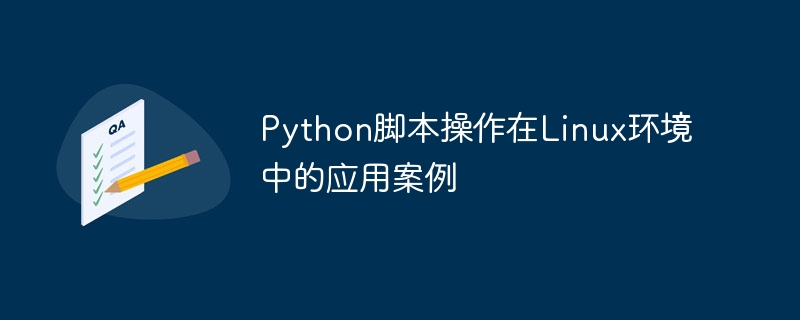

Application cases and code examples of Python script operations in the Linux environment
In daily system operation and maintenance and automated management, Python scripts have a wide range of applications in the Linux environment Applications. This article will introduce several practical application cases and give corresponding code examples to help readers better understand the practical application of Python scripts in the Linux environment.
In Linux systems, it is often necessary to back up important files regularly to prevent accidental data loss. By writing Python scripts, you can realize the function of automatically backing up files at regular intervals. The following is a simple backup script example:
import shutil
import datetime
def backup_files(source, destination):
now = datetime.datetime.now()
timestamp = now.strftime("%Y%m%d%H%M%S")
destination_path = destination + "/" + source + "_" + timestamp
shutil.copytree(source, destination_path)
print("备份成功!备份文件保存在:", destination_path)
source_path = "/path/to/source/files"
destination_path = "/path/to/backup/files"
backup_files(source_path, destination_path)In the above example, we first introduced the shutil library for file operations and the datetime library for obtaining the current time. Then a backup function backup_files is defined, in which the source parameter specifies the file path to be backed up, and the destination parameter specifies the directory where the backup file is saved.
In the backup_files function, first obtain the current time as part of the backup file name, and then splice out the complete backup file path. Then use shutil.copytree function to copy the source file directory to the backup directory, and print a prompt message indicating that the backup is successful.
By setting a scheduled task in the Linux system, the script can automatically perform backup operations every day.
In server operation and maintenance work, it is often necessary to monitor the system's CPU, memory, hard disk and other resource usage, as well as monitor the running status of the service. By writing Python scripts, you can monitor system resources in real time and send alerts to notify administrators when preset thresholds are reached.
The following is a simple system resource monitoring script example:
import psutil
import smtplib
from email.mime.text import MIMEText
def monitor_resources():
cpu_usage = psutil.cpu_percent(interval=1)
memory_usage = psutil.virtual_memory().percent
disk_usage = psutil.disk_usage('/').percent
# 检查资源使用情况是否超过预设阈值
if cpu_usage > 80 or memory_usage > 80 or disk_usage > 80:
send_alert_email(cpu_usage, memory_usage, disk_usage)
def send_alert_email(cpu_usage, memory_usage, disk_usage):
sender = "sender@example.com"
receiver = "receiver@example.com"
msg_text = "系统资源使用率过高:
CPU 使用率:{}%
内存使用率:{}%
磁盘使用率:{}%".format(cpu_usage, memory_usage, disk_usage)
msg = MIMEText(msg_text)
msg['Subject'] = "系统资源使用率过高警报"
msg['From'] = sender
msg['To'] = receiver
smtp = smtplib.SMTP('smtp.example.com')
smtp.send_message(msg)
smtp.quit()
monitor_resources()In the above example, we first introduced the psutil library to obtain system resource usage, and the smtplib library to send emails. Then a monitoring function monitor_resources is defined, which obtains the current CPU, memory, and disk usage through the psutil library. Then check whether the resource usage exceeds the preset threshold. If it does, call the send_alert_email function to send an email to the administrator.
In the send_alert_email function, we use the email.mime.text library to create the email content and set the subject, sender, recipient and other information of the email. Then connect to the mail server through the smtplib library and send mail.
By setting a scheduled task in the Linux system, the script can be used to perform resource monitoring operations regularly.
Summary
This article introduces two practical application cases of Python script operations in the Linux environment, and gives corresponding code examples. Through the cases of backing up files and monitoring system resources, readers can understand the powerful functions and flexible applications of Python scripts in the Linux environment. We hope it will be helpful to readers in Linux system operation and maintenance and automated management.
The above is the detailed content of Application cases of Python script operations in Linux environment. For more information, please follow other related articles on the PHP Chinese website!




